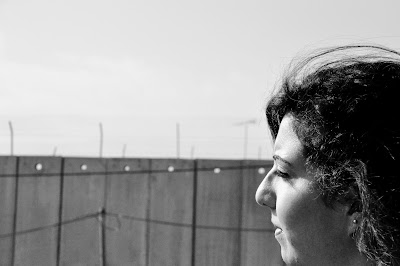Today I present you with a story from Jennifer {Kingston, Jamaica}, making this #25 in the Portraits of Justice series.
I had the honour of meeting Jennifer in Bethlehem, Palestine, last February when we were both present to consult on the Pilgrimage of Peace and Justice with the WCC. I took her portrait in Jerusalem, as we had tea with the locals and they shared with us about their desire to teach the children about each other across religious divides.
As Jennifer says, "I'm of a great age, I’m a grandmother." She has a special space in her heart concerning justice for children.
As Jennifer says, "I'm of a great age, I’m a grandmother." She has a special space in her heart concerning justice for children.
---
"In my country justice is the recognition of people’s lives, in all kinds of life’s situations. "
"There are institutions set up to protect justice for people, through our police department. However, justice is not experienced by all to the same degree. And so, truthfully, there are sometimes there are protests and cries for people calling for justice when they feel there rights trampled upon. Within this reply, there is an indication to me that the country is sufficiently aware of what justice is, so that when people feel badly done by, they protest, and expect due process to take place."
"At the moment we have a very sad case, the death of 19 newborn babies, all of them newborn babies. They came into the world in delicate condition. But all of them died, in two different hospitals. The investigations so far have shown that they died from bacterial or viral infections, which can really manifest themselves in any hospital in any place in the world, so there is an international protocol of care to prevent or reduce the effect of such infection. "
"But it was shown that in most cases proper protocol had not been taken. And because Jamaica is Jamaica, and we are a nation where people will speak out, the parents spoke out. It caused a national campaign, it caused loss of jobs, it cost the shape of a board, in fact it caused the renaming of a board, and an investigation - a full complete and open investigation.That represents a case in very visible justice, in process, because the whole thing is being looked at."
"The country was really quite alarmed, because no one was paying attention to the fact the children were delicate at the time of birth. If a child is premature, it is the duty of the country to protect that child, to the extent that the child has an opportunity to live.The system failed those children. I am sad, very very sad, about the death of the children. The loss and grief caused to the families. But I am happy that they have not gone in vain. "
"The consciousness of my country is sufficiently alive to recognize, to repent, and pledge to do better for the protection of our children. "
"The conscience of my country is sufficiently alive to recognize that we have a duty to protect our children. In the cases where they have died, we have failed institutionally, or in the case of parents allowing their children to journey alone and come to harm, we recognize we need to have improvements in how we care for our children. And so to challenge us into ongoing awareness, consciousness, and action, our country has erected a monument just outside the the council offices, of our city council, in Kingston. There is, I have to say, a hauntingly beautiful sculpture of the crying child. It is the face of a child, beautifully sculpted, and when you look at the face, you can actually see tears. And then there are names plaques on there recognizing some of the names of our children. "
"You cannot but see and feel the beauty of the soul of the child, the human person that has gone, and is remembered."















